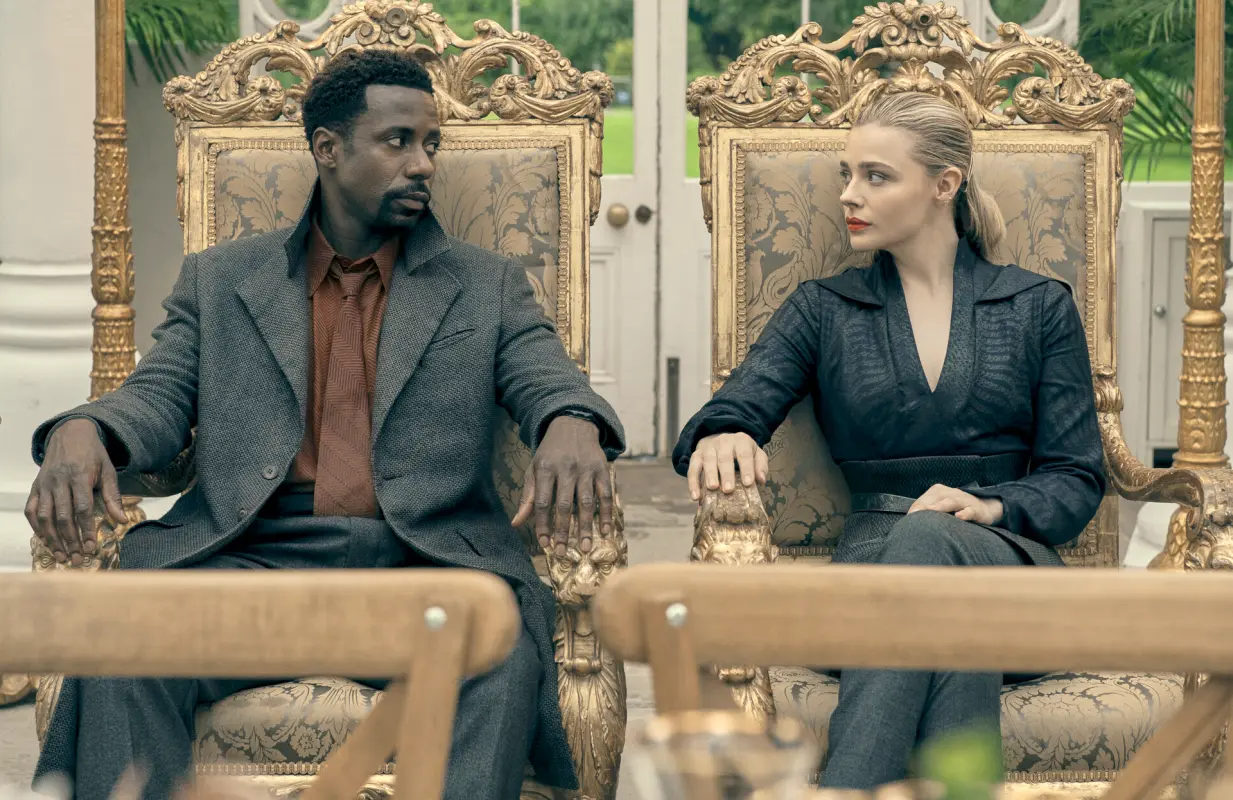Prime Video's The Peripheral Is Like a First Draft of Dystopia
-
 Gary Carr and Chloë Grace Moretz in The Peripheral. (Photo: Sophie Mutevelian/Prime Video)
Gary Carr and Chloë Grace Moretz in The Peripheral. (Photo: Sophie Mutevelian/Prime Video)Sleek buildings with sharp metallic edges flank large carbon-capturing historical monuments, suggesting a future that has come with both technological and social progress. But when Wilf (Gary Carr), one of the city’s inhabitants, snaps his fingers, the image of a shining city immediately dissolves to reveal desolation, ruin, and wreckage. In The Peripheral, this future dystopia is so busy trying to keep up the appearance of progress that it leaves viewers to make sense of its haphazard world building.
Adapted from William Gibson’s novel of the same name, the show straddles two different time periods. In 2032 Appalachia, we meet Flynne Fisher (Chloë Grace Moretz), a woman who works at a 3-D printing shop and earns extra money as a competitive gamer to make ends meet. In the first episode, she’s asked to test a new virtual reality game, but she quickly learns it’s a portal into the future. Whenever she puts on the high-tech headset that was sent to her by a mysterious employer, she’s pulled into London in the year 2100, which has been rebuilt after a catastrophe known as “the jackpot” nearly caused human extinction.
Oh and one last thing: when Flynne time travels, her body stays in Appalachia. Her consciousness, however, is inserted into a humanoid cyborg. This suggests that people in the future view the people from the past as interchangeable pawns, but beyond that, the show is stingy with concrete information about anyone’s motives. Likewise, time travel is sometimes presented as a harmless lark, and sometimes it’s implied to have dire consequences. One presumes that the creative team knows which interpretation is correct, but we viewers never do.
Smaller details are equally fuzzy, like how a covert drug dealer in Flynne’s era is able to literally crucify his enemies in front of his own business without arousing suspicion. This muddle makes it hard to invest in the show’s stakes. For instance, should we care about “stubs,” which are apparently alternate universes created each time someone jumps through time? When that very question is asked in the series, one character brushes it off while another urges caution. It’s unclear whether this is a critical detail that will define the plot or yet another loose thread. It’s exhausting to catalog all these random bits of information, since there’s no promise they'll ever be referred to again.
On a thematic level, however, the show is aggressively blunt, establishing a clear binary that the future is evolved and the past is primitive. Never mind that in post-apocalyptic London no one seems to have access to green space, while Appalachia in 2032 is filmed like an Eden of mountains and fields. Never mind that we see functional families in the past, while in the future Wilf is essentially at war with his stepmother and sister. The London characters never doubt themselves or express any interest in the world before. Instead, they’re driven by a vaguely defined quest for power. They all wear versions of the same gray-and-black outfits and speak with the same imperious tone, snarling at each other with the haughty arrogance of standard-issue villains.
This is disappointing for those who want to engage with the discomfort that dystopian fiction can inspire. It’s surprising, too, since executive producers Jonathan Nolan and Lisa Joy also created HBO’s Westworld. That show can certainly be confusing, but it’s rooted in vivid characters and a clear sense of tension between the world inside the titular theme park and the world outside it. By comparison, The Peripheral is a first draft, struggling to make sense of social collapse.
The Peripheral premieres on Prime Video Friday October 2. New episodes drop Fridays through December 9.
People are talking about The Peripheral in our forums. Join the conversation.
Alexi Chacon is a theatre and culture critic based in Philadelphia. His writing has appeared in the Philadelphia Inquirer, The Body, Theatrely, The Brooklyn Rail and more.
TOPICS: The Peripheral, Prime Video, Chloë Grace Moretz, Gary Carr, Jonathan Nolan, Lisa Joy